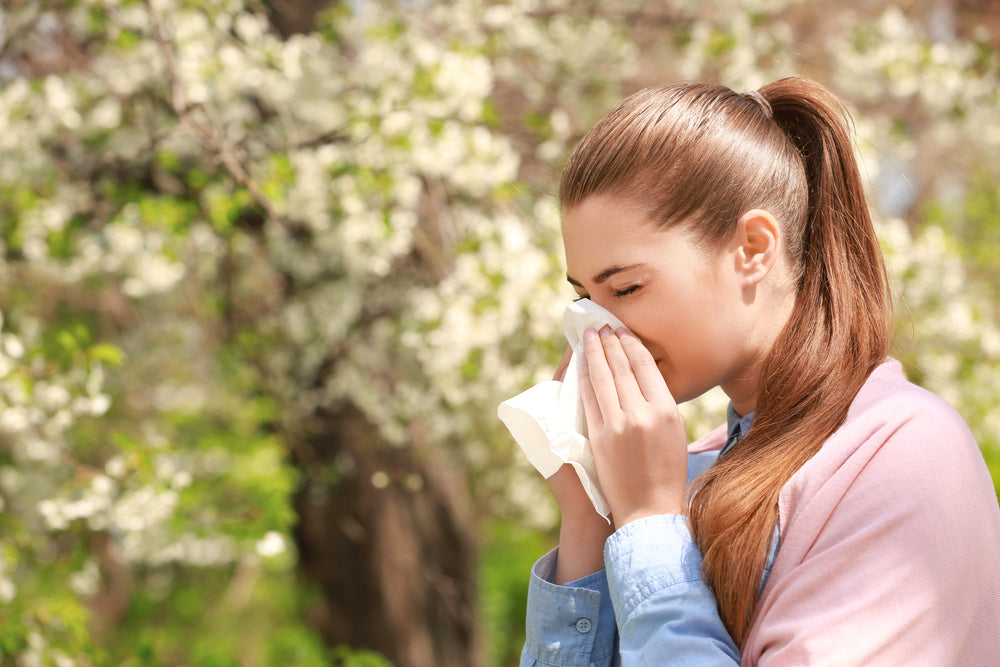Free U.S. Shipping On Orders Over $150

Traveling With Allergies: 6 Triggers to Watch Out For
Posted on
For people with allergies, traveling can be difficult and even dangerous. There are potential triggers all around you and you could get an allergy attack when you least expect it. From dust mites in buses to the dry air in an airplane, here are the most common allergy triggers to watch out for plus tips on how to avoid or mitigate them.
Common Allergy Triggers When Traveling
1. Dust & Dust Mites
Dust and dust mites are some of the most common allergens you will encounter when you travel. You will find them in trains, buses and even airplanes. You can also find them waiting for you in your hotel bed.
Most people are not affected by dust and dust mites, but if you are allergic to them, they can cause respiratory issues like sneezing, runny nose and more.
Solution: Wear a face mask when traveling to avoid breathing in allergens. Our Aplu face mask is perfect for long flights and is designed to be gentle on your skin.
2. Dry Air
Dry air doesn't directly trigger allergies, but it can make you more vulnerable to allergens. Dry air reduces the amount of mucus in your nose. Because mucus plays an important role trapping allergens, having less of it exposes you to more allergens.
Allergens like dust, dust mites and mold spores also tend to move in air better when the air is dry. So you will likely breathe more of them in.
Dry air is a major problem if you are flying. The air in an airplane is typically kept at a low humidity. You may also experience problems with dry air when traveling to some destinations like Arizona, Texas or any other dry climate, or if you are traveling during winter when air is drier.
Solution: A saline spray can help keep your nose moist. Also consider carrying a personal humidifier that you can use in a hotel or Airbnb. It will be especially helpful in helping you sleep better.
3. Seasonal Pollen
If you have a pollen allergy, spring and summer travel can be problematic. This is when trees and plants bloom, filling the air with pollen.
Traveling by road or train can expose you to airborne pollen. Air travel is not safe either. Pollen can cling onto clothes and luggage. The dry air in the plane could make your pollen allergy worse.
Solution: Research the pollen count of the place you are planning to visit. Time your trip for when the pollen count is lowest. When traveling outdoors, wear a mask to avoid breathing in pollen.
4. Mold
Even though airplanes have low humidity, they can still have mold in certain areas like the washroom and tray tables. You can also get exposed to mold spores in trains, buses and other forms of transport. Your hotel room or vacation rental may also have mold that you can’t see.
Mold spores can cause serious allergic reactions and can even trigger an attack in people with asthma.
Solution: Again, masks come to the rescue. An N95 mask offers the best protection against mold spores. As for where you sleep, try to find good quality accommodation where you can be sure they take cleaning and hygiene seriously.
5. Insects
For some people, a simple insect bite can be a serious problem. For others, it can result in serious symptoms like shortness of breath, anaphylaxis, nausea, fever and fainting.
If you have an insect allergy, take extra care when traveling outdoors or to a tropical destination. You will encounter bugs in these places.
Solution: If you have severe insect allergy, avoid traveling to places where there’s likely to be lots of bugs. Always carry EpiPen or any other allergy medication just in case you get stung or bitten by an insect. Using insect repellents can also help keep you safe.
6. Food
A food allergy can make traveling particularly tough. You can’t freely explore all the delicacies you come across and you have to be super careful about everything you eat in restaurants or during your flight.
Solution: If you are planning to eat at a restaurant, always carry a chef card that lists your food allergies. It helps staff avoid potentially deadly mistakes when preparing and serving your meal. Alternatively, let the staff know of any particular food allergies that you have before you order.
Avoid foods whose ingredients you can’t be sure about (e.g. street food) and check labels when buying packaged food. And don’t forget to carry an EpiPen or allergy medication in case of an emergency.
Quick links
Contact
6063 Hudson Road #160
Woodbury, MN 55125
Yo@hercLeon.com
Leave a comment: